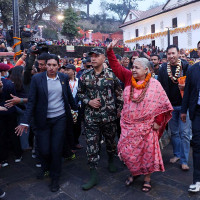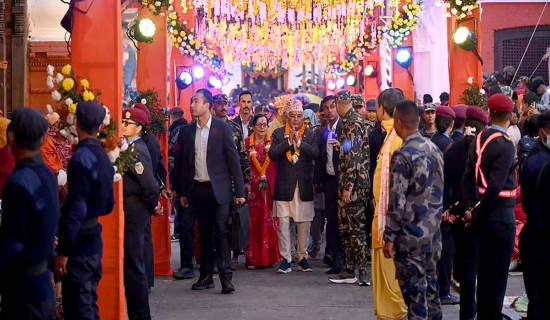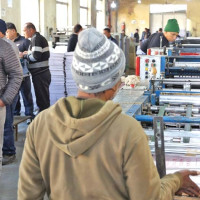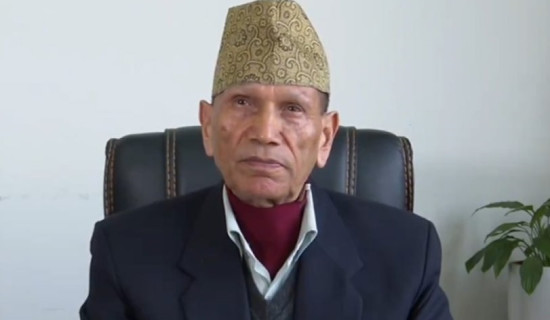- Monday, 16 February 2026
Campaigning period will be shortened to reduce overspending in polls: CEC
The government has set the date of the House of Representatives (HoR) and Provincial Assembly elections for November 20 and the Election Commission of Nepal (EC) has expedited the preparations to hold the election in a free and fair manner. The EC has endorsed the election schedule. In this context, Arpana Adhikari of Rising Nepal talked to Chief Election Commissioner, Dinesh Kumar Thapaliya. Excerpts:
What stage has the preparations for the upcoming federal and provincial elections reached now?
The periodic election has been included in a regular program of the EC. Along with the work of reviewing the May 13 local polls, the EC has identified the issues needing improvements and already started its preparations for federal and provincial elections accordingly.
After the declaration of the election date, the commission immediately endorsed the election schedule and forwarded its preparations. Recently, election offices for the election of proportional representations category have been established.
The political parties have already submitted their applications to get registered at the EC for the election and the commission will soon finalize the list. In the same way, the commission will soon call for the registration of the political parties willing to participate in the election under the PR category.
The work of developing the final electoral roll and reviewing and adding polling stations and centers have been going on simultaneously.
The commission has already initiated the work of managing and purchasing the necessary election materials. Besides, the EC has also begun the process to take action against those candidates in the recent local poll who have failed to submit expenditure details.
What are the challenges of the upcoming elections?
Amid long debates, the EC is firm in its opinion that elections should be held in one phase to make the slogan of cost-effective elections successful. We have seen many positive achievements at the same stage. However, I have seen the possibility of four or five challenges in this election.
Conducting the elections on the same day and at a single phase without any obstruction is the first challenge the EC has. The commission should ensure that the polling should be completed in all places on the same election date. Appropriate security arrangements should be made accordingly.
We should have the ability to face the possible wrong actions of political parties and candidates. Disruption to the electoral process in any place is like a small injury to the body of the Commission. This should not happen for the sake of democracy and the country and for all those who believe in elections.
Implementation of the election code of conduct and monitoring and compliance with election expenses are the second challenges. This time the local elections were not very flamboyant.
But we could not see or understand the internal anti-democratic activities and efforts to influence the opinion of the sovereign people in other ways. Efforts should be made to follow the code of conduct in all areas.
Thirdly, the issue of social media sites is very complicated. Everyone should make effort to stop the misuse of social media.
Monitoring political advertisements in social media and mass media is another challenge the EC has, which will affect free and fair elections.
Similarly, there is also the threat of cybercrime during the election. We have seen from the elections of other countries that even the website of the Election Commission was misused at times. The commission is aware of that. Controlling hate speech, misinformation and disinformation is another challenge facing the upcoming elections.

What are EC’s measures to reduce invalid votes in the coming elections?
Looking at invalid votes in the local level elections, we cannot predict that the same will happen in the election to the HoR and the Provincial Assemblies.
There is a need to analyze the federal and provincial elections of 2017 and identify the areas that need to be improved.
There will be separate ballot papers for the First-Past-The-Past (FPTP) and Proportional Representation (PR) systems for both the federal and provincial elections. The ballot papers will have election symbols of only those political parties and independent candidates who have filed their candidacies in the concerned constituency under the FPTP election.
The voters will have to cast vote for a single candidate on one ballot paper.
This will require us to print around 80 million ballot papers but it will help reduce invalid votes as they will only be printed after the candidates and parties are finalized.
There will be four ballot papers and four ballot boxes. Now the ballot papers will be printed according to the closed list of candidates submitted by the parties who want to participate in the Proportional Representation (PR) category. 503 types of ballot paper will be printed, including 165 for HoR, 330 for Provincial Assembly, seven for the seven provinces, and one unique type for the PR category of HoR elections. We will conduct voter education in a way that will prevent the invalidity of votes.
The Supreme Court has issued a verdict to ensure the right not to vote provision in the electoral process and ensure the voting rights of Nepali citizens living abroad.
What is the EC’s take on this? Is it possible to ensure this right from the coming election?
We respect the SC’s decision and we implement its verdict as per the existing legal provisions. Current law doesn’t allow putting separate boxes and election symbols for ‘No vote’ in the ballot paper.
Similarly, it maintains that to cast a vote in elections, Nepali citizen should have their name on the voters' list. But it doesn't allow installing a polling booth outside the country’s territory.
Therefore, those who have their name on the voter's list can cast their votes from their respective polling stations in the country. However, the EC will make a law with a provision to facilitate Nepalis in foreign countries to vote in elections in their home country. It has recently obtained the agreement in principle from the government to create an integrated law for all polls.
As the EC has forwarded its plan to allot only 15 days for poll canvassing, what is it doing to enforce this provision?
The arrangement is being sought by the political parties themselves to prevent candidates from overspending because of the long electioneering period. There are suggestions that the longer the campaigning period, the costlier the election will be. So, we are mulling reducing the campaigning period to prevent overspending from candidates and political parties and also to cut off extra expenses of the commission and agencies under it.
The longer the campaigning period, the more violations of the election code of conduct will be. And to prevent this, the commission and the concerned agencies have to spend extra expresses from state coffers in the name of monitoring and taking action. The commission had forwarded its plan to the political parties for further consultation and we believe that the political parties will accept this.
What steps has the EC taken to discourage the tendency prevalent among the political parties and their candidates that they should win the election at any cost?
The first thing to control such tendency is the implementation of the Election Code of Conduct. This year, the EC approved the Code of Conduct and implemented it. Now, we have sent the Code of Conduct to the political parties for their suggestions to make it more effective and practical.
Honest implementation of the code of conduct is one aspect. We also need to empower the voters as well. The voters are all powerful and no candidate has the right to challenge their power.
It will be a big achievement if we empower the voters and send a message to the people that only moral and honest candidates should win the elections. Violation of the code of conduct and law should always be punishable. We need to instill the feeling in the voters that wrongdoers will be punished on the spot. We have to make effort to convey the message that wrongdoers cannot escape the law.
Election in 85 voting centers was postponed in the recent local level election. What preparations have the EC made to avert such a situation in the upcoming poll?
At present, the EC has been writing to the concerned agencies for the management of the security of the polling centers. Four to five aspects should be considered to manage security.
First, let’s prepare details as to where the election processes had been obstructed from 2008 to 2022 and find the reasons for such obstructions. Likewise, we should identify weaknesses in controlling such incidents and inform the home ministry about this.
Similarly, all voting centers could not be kept in the same category. The EC had never imagined that it had to conduct reelection in Budhiganga Municipality of Bajura.
Even the security mechanism had not imagined reelection there. But, we had to hold reelection. Take it as a mere accident, a man-made accident. Obviously, it was the outcome of hateful activities of the political parties. No political party should resort to such activities.
We should make a plan to address any unwanted incidents if they happen. We should not hesitate to take action against wrongdoers immediately and if we delay in punishing the wrongdoers in time, the consequences will be not good. No excuse should be there to seek legal remedies for such issues.
What is EC’s plan to make this federal and provincial election cost-effective like recently held local polls?
Compared to the previous local polls, the May 13 local poll was very cost-effective. However, the expenses of the upcoming federal and provincial elections will be high, as we have to spend a huge amount of budget in certain areas. The EC has to purchase 60,000 more ballot boxes.
Compared to local polls, we have to mobilize approximately 100,000 more manpower for the upcoming election and there is also a 15 percent increment in staff’s salary. In local polls, over 20 million ballot papers were printed, however this time, over 80 million ballot papers have to be printed. We are also adding some polling stations and polling centers.
Moreover, EC has also planned to ensure voting rights to the employees and security persons mobilized for the election and the inmates and voters sheltered in the old age homes by including them in the temporary voter list.
This data itself reveals the fact that the expenses will be increased in the upcoming elections than the local poll. Despite all these, the commission will wisely spend the budget managing transparency.








-square-thumb.jpg)








